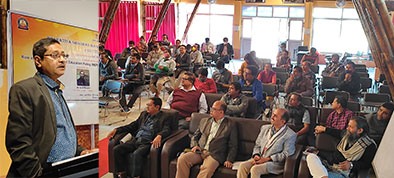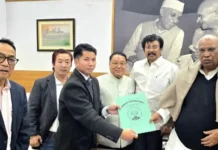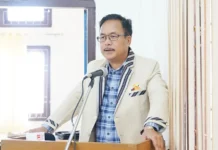ITANAGAR, 12 Feb: The National Institute of Technology (NIT), Arunachal Pradesh, under the banner of the Bharatiya Shikshan Mandal (BSM) Arunachal Pradesh and Niti Aayog, conducted a seminar on ‘Role of Teacher’s in National Education Policy (NEP): Awareness, Orientation, Challenges and Responses’.
In her keynote speech, NEP Draft Committee Member, Prof Vasudha Kamat spoke on the key principles and idea behind the foundation of NEP 2020.
She emphasized on the need of conceptual understanding of each and every subject, critical thinking capabilities and creativity to encourage logical thinking among students.
“The NEP 2020 also has a view for fostering the unique capabilities of student,” she said and threw light on the new vision expected from the higher education institutions from NEP 2020.
She also said that the Government of India is about to come up with multidisciplinary education and research universities (MERU) by 2030, at least one in every or near district.
These institutions will come up with 3 to 4 year undergraduate programs with multi-exit options. Curriculum will offer multidisciplinary education where there will be no hard separation between streams and will be offered with a learner centered pedagogy.
Coming to the observation part of the Kasturi Nagarajan Committee, who came up with NEP 2020, she said that the report mentions the present scenario of faculties referred to the above aspects are far lower than the desired level.
“Overcoming of these lacunae is aimed with reducing of teaching loads, improvising existing student-teacher ratio, implementing interactive sessions between teacher and students, conducting collaborative research works with other universities. This all will help to achieve the goal of truly creative and outstanding works in the education sector. The freedom to design own curriculum by faculties will be realized with multidisciplinary curriculum and innovative pedagogy. And assessment of these works will be based on outcome, experiences and evaluation with a closed loop formation,” she said.
Speaking on various aspects, social thinker and eminent educationist Dr Sunil Mohanty mentioned the need for regular assessment of education sector and need of complete reformation as per NEP 2020 which can help India to attain the lost glory in field of Education and Knowledge Dissemination.
JNU, New Delhi retired professor Anand Kumar specifically highlighted the status of school teachers in India and said that “much has to be done for their upliftment and motivation.”
“Teachers are capable minds but lack of interaction with modern technology has limited their performance a lot,” he said.
“Also, the need of increase in investment is required in education sector which presently is only two third of what is actually required,” Prof Kumar pointed out and expressed his expectations of increase in investments by government utilities in education sectors in the upcoming state budget reports.
Mentioning the major six challenges of India, Prof. Kumar highlighted realization of actual literacy with digital skills, overcoming poverty, decrease in drop-out rate from schools in rural areas, increase in seats at HEIs which is only 25% of the required figure at present, de-colonization of education model and inclusion of Indian Traditional values and ethics. Sanskrit Teaching and Mathematics in applied form needs focus, he mentioned. The differences in facilities available at villages and urban areas should be worked out to stop the plight of human resources from rural to urban areas. NEP 2020 comes with 22 skill development motives. Speaking in favor of Educational Cess. Tax Scheme, he said the priviledged group can be taxed for increasing the investment in Education Sector. He finished his talk mentioning that in present world a teacher has to be an activist, a role model for young generation and a message for others.
This was succeeded by presidential speech by Prof. Mahanta, Director NIT Arunachal Pradesh. He expressed his concern and agreement with all the expressed views of the delegates. Adding further he mentioned some new ways of teaching which can be a paradigm shift from theoretical teaching to applied approach. This will be helpful to quench the thirst of curious smart generation who carries a high Intellectual capability. He also informed that very soon NIT Arunachal Pradesh is coming up with new courses to impart Intellectual Property Rights (IPR) education for its students to boost the start up ideas and encourage the new graduates to become successful entrepreneurs.
The day ended with a break-out session among the present faculties of the institute who expressed their views in implementation of NEP 2020.
Among others, the event was attended by NIT Arunachal Director Prof Pinakeswar Mahanta, Associate Professor Dr RP Sharma, Dean Academic Dr Rajen Pudur.




